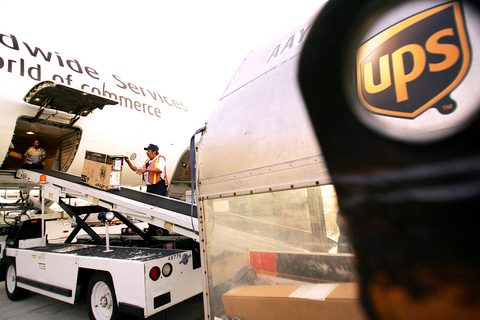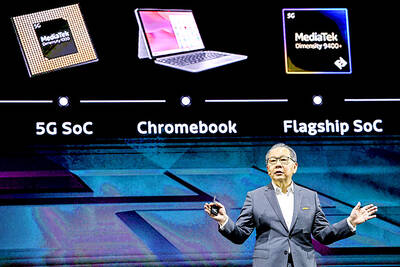United Parcel Service Inc (UPS), the last remaining customer for the cargo version of the Airbus A380 superjumbo jet, said on Friday that it was walking away from its order for 10 planes, citing concerns that Airbus would not be able to meet a revised delivery schedule.
The cancellation by UPS, four months after its main competitor, FedEx Corp, also abandoned an order for 10 planes, leaves Airbus without a customer for the A380 freighter. It is another blow to the company, which announced this week the details of a cost-cutting plan that is expected to result in the loss of 10,000 jobs across Europe over the next four years.
"This is another slap in the face for Airbus," said Doug McVitie, a consultant at Arran Aerospace in Dinan, France. "UPS will probably turn to Boeing now for good."

PHOTO: AFP
The move follows a confirmation by Airbus late on Monday that it had halted work on the A380 freighter to concentrate on the passenger version of the plane, now two years behind schedule.
"This is a decision; it's final," said Mark Giuffre, a spokesman for UPS in Louisville, Kentucky.
UPS said its decision would be formally presented to Airbus at the first opportunity allowed under the terms of an agreement reached last week that gave either party the right to cancel the order. The date has not been disclosed, but John Leahy, the Airbus chief operating officer for customers, said last week that the date fell in the second half of this year.
The announcement appeared to catch Airbus by surprise. In an e-mail exchange hours before the announcement, Leahy indicated that he had not been expecting a decision by UPS for some time.
"The order remains on our books until UPS makes a final decision," Leahy wrote.
UPS, the largest package delivery company in the world, had originally expected its order -- valued at US$2.8 billion -- to be delivered beginning in 2010. The company disclosed on Friday that the latest agreement with Airbus had delayed those deliveries by two years.
"Based on our previous discussions, we had felt that 2012 was a reasonable estimate of when Airbus could supply this plane," said David Abney, chief operating officer of UPS and president of UPS Airline.
But after Airbus decided to divert workers to the passenger version, "we no longer are confident that Airbus can adhere to that schedule," he said.

SEEKING CLARITY: Washington should not adopt measures that create uncertainties for ‘existing semiconductor investments,’ TSMC said referring to its US$165 billion in the US Taiwan Semiconductor Manufacturing Co (TSMC, 台積電) told the US that any future tariffs on Taiwanese semiconductors could reduce demand for chips and derail its pledge to increase its investment in Arizona. “New import restrictions could jeopardize current US leadership in the competitive technology industry and create uncertainties for many committed semiconductor capital projects in the US, including TSMC Arizona’s significant investment plan in Phoenix,” the chipmaker wrote in a letter to the US Department of Commerce. TSMC issued the warning in response to a solicitation for comments by the department on a possible tariff on semiconductor imports by US President Donald Trump’s

‘FAILED EXPORT CONTROLS’: Jensen Huang said that Washington should maximize the speed of AI diffusion, because not doing so would give competitors an advantage Nvidia Corp cofounder and chief executive officer Jensen Huang (黃仁勳) yesterday criticized the US government’s restrictions on exports of artificial intelligence (AI) chips to China, saying that the policy was a failure and would only spur China to accelerate AI development. The export controls gave China the spirit, motivation and government support to accelerate AI development, Huang told reporters at the Computex trade show in Taipei. The competition in China is already intense, given its strong software capabilities, extensive technology ecosystems and work efficiency, he said. “All in all, the export controls were a failure. The facts would suggest it,” he said. “The US

The government has launched a three-pronged strategy to attract local and international talent, aiming to position Taiwan as a new global hub following Nvidia Corp’s announcement that it has chosen Taipei as the site of its Taiwan headquarters. Nvidia cofounder and CEO Jensen Huang (黃仁勳) on Monday last week announced during his keynote speech at the Computex trade show in Taipei that the Nvidia Constellation, the company’s planned Taiwan headquarters, would be located in the Beitou-Shilin Technology Park (北投士林科技園區) in Taipei. Huang’s decision to establish a base in Taiwan is “primarily due to Taiwan’s talent pool and its strength in the semiconductor

NEW PRODUCTS: MediaTek has been diversifying its product lines to minimize operational risks as mobile chips remain the company’s biggest revenue source MediaTek Inc (聯發科), the world’s biggest supplier of smartphone chips, yesterday said the tape-out process for its first 2-nanometer chip would take place in September, paving the way for volume production of its most advanced chip, likely to be its next-generation flagship smartphone chip, around the year-end at the earliest. MediaTek has been leveraging advanced process technologies from its foundry partner, Taiwan Semiconductor Manufacturing Co (TSMC, 台積電), to build its flagship mobile phone chips, a segment it once relinquished and then recovered four years ago as it released its Dimensity series. In the semiconductor industry, a tape-out refers to the